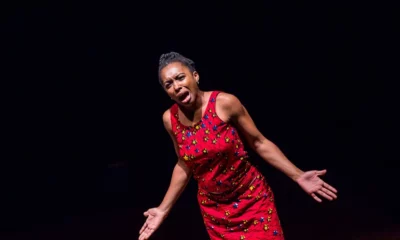Features
Peace Akinyode: Tired of Court Battles? Try Mediation

A pig almost led to a full-blown war between the United States of America and Britain. In 1859, Britons and their neighbours across the pond nearly traded bullets and grenades over a hog.
The Pig War began when Lyman Cutler, a US citizen living on San Juan Island, fatally shot a pig belonging to his neighbour, Charles Griffin, after it invaded his farm. Griffin, an employee of the British government, demanded $100 in compensation, while Cutler offered $10. When the neighbours refused to settle, the British authorities on the island threatened to arrest Cutler, and in response, the American settlers invited their military for protection.
In short, the governments of the two countries recognised the dangers of the strife turning into a war and resorted to negotiations instead. Their deliberations transcended the dead-pig conflict and touched on the real crux of the matter – the boundary dispute between both countries on the San Juan islands. In 1872, a three-man arbitration panel eventually placed San Juan in the territory of the United States, ending the decades-long stand-off.
The utter ridiculousness of this 19th-century squabble reminds me of a quote affixed in the Oyo State Multi-Door Courthouse (OYSMDC), which reads, “It is more rewarding to resolve a conflict than to dissolve a relationship.” Imagine the scale of destruction that would have ensued if both sides had stuck to their guns and decided to go all-out war instead of deliberating and preserving their neighbourly relations.
Alternative Dispute Resolution (ADR) is a growing trend in many countries of the world, including Nigeria. The term, ADR, refers to a wide range of processes that aid disputants in settling conflicts without long-winded battles in the open court. Commissioned in 2018, the Oyo State Multi-Door Courthouse is one of the court-connected ADR centres in Nigeria, where parties have access to ADR mechanisms, including but not limited to, arbitration, conciliation, and mediation.
Mediation is one of the many processes that I had the chance to observe during my internship at the OYSMDC from May to August 2022. The popular ADR technique involves a neutral third party known as a mediator, who assists disputing parties as they navigate their differences toward a consensual resolution.
During my internship at the center, I shivered through several sessions of crossfire between business partners, family members, neighbours, communities, etc. Despite the heat brought in by conflicting parties, my insulation-deficient body could barely handle the temperatures that swam through the rooms, which were deliberately kept low to facilitate a cooler atmosphere for deliberation. Even if you were boiling with rage on your way to the meeting, your blood cools down in a matter of seconds when that 16°C breeze hits you.
This tiny detail, as well as many other elements put in place by the OYSMDC, demonstrated the intentionality to ensure parties walked out of the door with a better relationship than the one they entered with. Mediators will usually reiterate to parties during proceedings that they were not there to assign blame or pass judgement. They made sure disputants understood that the end goal of every meeting was to reach an amicable middle ground.
It is worthy of note that mediation caters only to a select class of cases, which includes but is not limited to, contractual disputes, family matters (except divorce and child custody), land matters, and debt recovery. Generally, criminal cases cannot be handled by mediation except in situations where an issue which forms part of the criminal case is referred to the mediator by the court.
A mediation proceeding can be instituted either by referral from the court (that is a judge’s order) or by the parties’ voluntary applications. After disputants pay a token for administration fees, the mediator fixes a convenient date for the first session. In the first meeting, parties are introduced to the workings of the mediation process, the general rules of engagement, confidentiality as a principal rule, and every other element that makes the technique a smooth, effective, and efficient one.
During proceedings, a mediator listens attentively and takes notes of all the sides of the story. Noticeably, these stories might not be part of the official statement of claims or defence, and if it were in the regular court, these facts would be treated as extraneous. This shows another advantage of mediation over court processes, as it provides a chance for parties to fully speak their minds without the restraints of formality.
When it seems that parties are edging towards a stalemate, the mediator arranges an ex parte meeting, also referred to as a “breaking caucus”. Here, parties can individually enter into something similar to a Catholic confession. In my experience, the caucus room is where the real issues spill out: the history of the parties’ relationship; motives behind individual actions; undisclosed interests; and other key parts of the conflict which a party would rather not reveal at the joint session for personal reasons.
While the information here is strictly confidential, the parties can give consent to the mediator to reveal those facts to the other party if it will aid the progression of the matter. Either way, the mediator has to find a way to bring these issues into consideration in a manner that draws parties to reach a middle ground in the conflict while still respecting their confidentiality.
One thing that caught my attention during every session was the demonstration of a high level of emotional intelligence by the mediators. I noticed they were adept at capturing things people were saying without speaking. A grimace, a hesitation in speech, a stubborn pursing of lips, slight hisses, eye rolls. The mediators noted all these which allowed them to get a glimpse into the minds of the parties.
On my resumption as an intern, the immediate-past director of OYSMDC, Anuolu Gade, asked me why I was interested in Alternative Dispute Resolution. To answer her question, I referred to my previous experience while interning at a law chamber in 2019. During the three months of my 2019 internship, I never got to see a case from start to finish. Thanks to Nollywood, I’d expected to see several cross examinations heavily punctuated with yells of “objection, my Lord.” Unfortunately, all I mostly witnessed were motions and applications. The bureaucratic and cumbersome process of the court system left me with a deep sense of dissatisfaction as a student and pity for the parties involved, whose lives or businesses were stunted in some way by a never-ending case.
Once, I had to search for a case file that was years older than me and was still ongoing at the time. Conversely, most mediation cases I witnessed were completed in a matter of weeks, and usually within three meetings or less. Rather than wasting years on a court case, parties to mediation have the advantage of solving their problems and returning to their normal lives within a short period of time.
Also, while the adversarial court system has its advantages, the preservation of cordial relationships between parties is not one of them. A popular saying among Yoruba people is, a kìí lo kótùù kí á padà lórèé (we can’t go to court and come back friends). One memory that stuck with me in my previous internship at the law office was a client getting angry with my principal because he’d exchanged a jovial greeting with the opposing counsel. Both lawyers were university mates, and they’d just finished slugging it out in court like sworn enemies a few minutes ago. By the client’s expectation, lawyers from opposing sides of the dispute were meant to be at war just like the parties they represent. If we are really aspiring to a more cordial existence as a society, our courts should not serve as fuel, adding to the raging fire between disputants.
Dispute settlement should have the relationship of the parties as a priority. It is understandable that the court of law should be decisive, weigh evidence and arguments on a balance, and give victory to whomever the justice scale tilts towards. However, this shouldn’t be done, in a way that completely ruins relationships between parties, especially families. It’s a good thing that courts recognise this and send matters that can be better deescalated by mediation to institutions like the OYSMDC.
Apart from individual relations, embracing mediation in communal matters will go a long way in aiding peace and harmony in the highly diverse Nigerian society. I witnessed several cases which had heavy undertones of religion and tribal differences. Muttering prayers under my breath, I once watched parties that fell into this category throw thinly veiled threats and insults at each other. Not to bore you with details (well, I’m under an oath-backed Non-Disclosure Agreement anyway), when the mediator was done helping parties understand their differences, they ended up apologising to each other with a promise of cordiality written in their amicable smiles.
Speaking of NDAs, parties also have the power to decide who could or couldn’t sit for their cases in mediation. Conversely, if you take a matter to the open court, it automatically becomes public business. Interns were occasionally excused from the mediation room because parties did not feel comfortable with anyone else listening to their case. Thus, another advantage of mediation is the grace of solving your matters out of the public view and glare, as it obtains in a regular court. This is especially suitable for families and businesses.
Just like my continuous mention of “parties” (as the reader can observe), mediation places much emphasis on the disputants having charge over their cases. With the way the technique is set up, parties get to determine the direction of their case under the close guidance of the mediator. This makes them feel in control, less tense, and consequently more open to actually solving their disputes. The control which they feel they have to submit to men and women in robes in a courtroom returns to their hands in a mediation session.
My experience at the OYSMDC would be incomplete without mentioning the amazing members of staff and fellow interns who have become friends during one of the most sanity-threatening ASUU (Academic Staff Union of Universities) strikes for me as a Nigerian University student. Our analysis of cases, the writing of reports, notifying mediators of parties’ misconduct during sessions, and everyday arguments that oscillated between socio-political debates and light-hearted banter were notable highlights of my internship experience.
In short, my experience at the OYSMDC was beautiful all through. There was barely a day I did not return home armed with the renewed hope of a less-chaotic human existence.




















